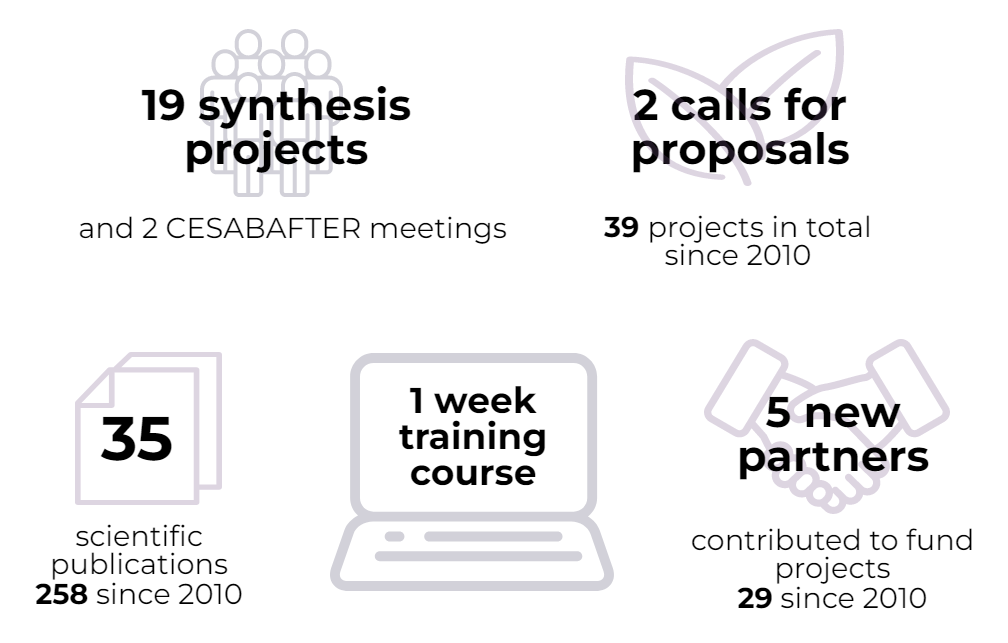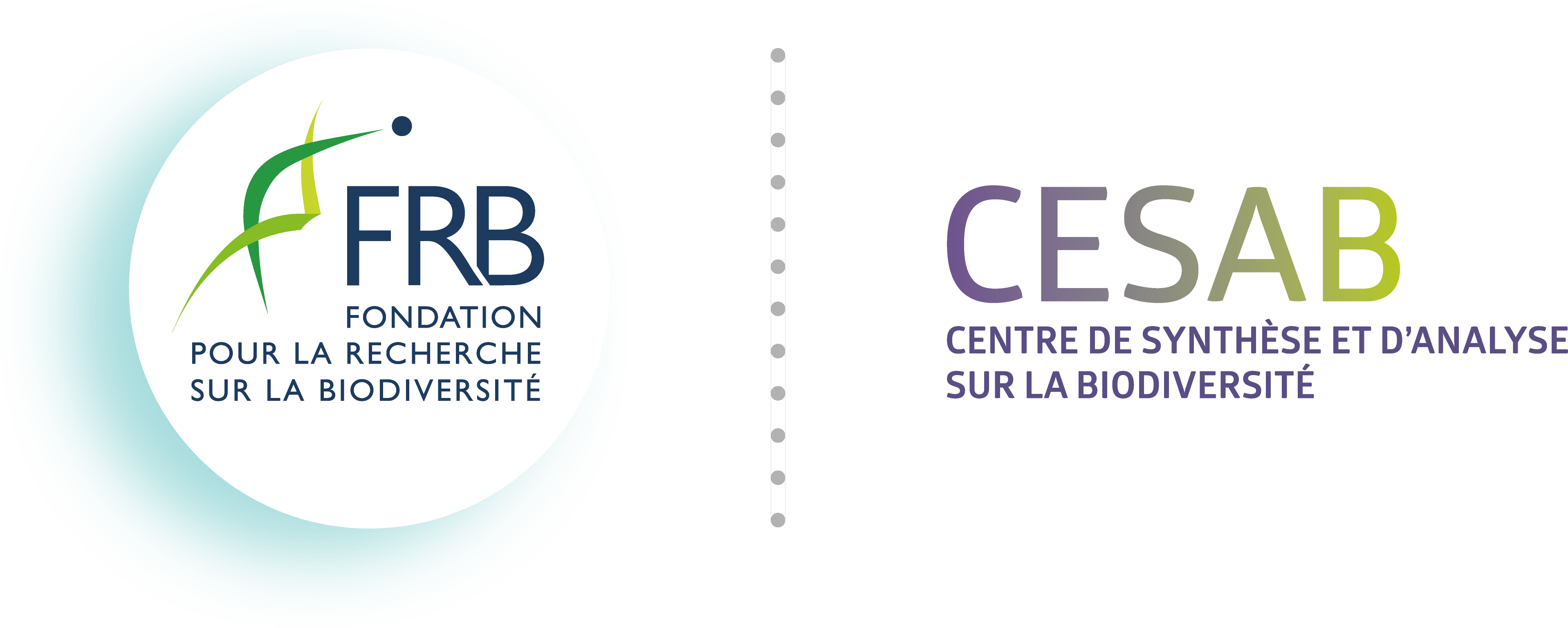[FRB-CESAB] Newsletter 6 CESAB – January 2022
The FRB’s Center for Biodiversity Synthesis and Analysis (CESAB) is a research structure with an international scope whose objective is to implement innovative work on the synthesis and analysis of existing data sets in the field of biodiversity. Twice a year, the CESAB publishes a newsletter listing the different news and activities going on.
![[FRB-CESAB] Newsletter 6 CESAB – January 2022](https://www.fondationbiodiversite.fr/wp-content/uploads/2019/05/FRB-Cesab-CS-Bruno-Fady.jpg) Bruno Fady
Bruno Fady A WORD FROM BRUNO FADY, PRESIDENT OF CESAB’S SCIENTIFIC COMMITTEE
It is worth recalling that CESAB is an infrastructure of the FRB, a unique and original tool in the French research landscape. It is one of the rare scientific tools that have been created in the world over the last 30 years, based on the observation that the data generated, and collected during short-term projects, that classically finance research in ecology and biodiversity, are not very well used (Baron et al., 2017). We can only welcome this decision, given the scientific production of the working groups funded with the CESAB, the career path of the young scientists who have been part of and are often the core of these working groups, and the recognition of the work published by many private and institutional actors to improve biodiversity protection (see “CESAB in a Zoom in 2021”).
The Covid-19 pandemic pointed out that scientific advances are not the work of an isolated individual, of an (unrecognized) genius who emerges in the midst of a crisis, but rather the work of collectives, manipulating and analyzing data that must be compiled and verified, re-testing and re-verifying hypotheses and concepts. A scientific fact only really becomes so when it finally emerges as an evidence, a consensus (in the statistical sense of the term) for the whole scientific community. At a time when the scientific approach and its results are being questioned by part of society, and beyond a relevant (re)development of data, concepts and their analysis for its scientific discipline, the role of CESAB is to disseminate scientific facts to better understand and protect biodiversity.
After two mandates as president of the CESAB scientific committee, it is time for me to hand over. I would have gladly extended my mandate for a longer period of time as the dynamism of CESAB is so strong, reminding me a little of the enthusiastic state of mind that reigned when it was created more than 10 years ago. But, fortunately, our statutes do not allow it and a new scientific committee will be created in 2022.
The CESAB is now a French institution, widely recognized. Scientists working in the field of ecology and biodiversity are not mistaken, they apply each year in greater numbers to the FRB-CESAB calls for proposals. I hope that the founding members of the FRB, the French public authorities and biodiversity stakeholders will continue to actively support the CESAB, financing at least several working groups per year and the structure itself. With France’s reaffirmed commitments to biodiversity protection at the World Conservation Congress in Marseille in September 2021, I have no doubt that this will be the case.
Happy New Year to all, welcome to the new scientific committee and long live the CESAB.
Bruno Fady
The FRB-CESAB is increasingly committed to training young researchers in the tools to analyse biodiversity and proposes three training courses in 2022, including two new ones.
- Theory-driven Analysis of Ecological Data / 16-20 May 2022

This new 5-day training course, organized with the GdR TheoMoDive aims to train young researchers in analyzing ecological data using theory-driven approaches. The training course will be in English and will take place from the 16th to the 20th of May 2022 in the CESAB premises in Montpellier.
-
- Pre-registration is open!
-
Pre-registration deadline: 14 February 2022, midnight (CET)
- Biodiversity knowledge synthesis: an introduction to meta-analyses and systematic reviews / 3-7 October 2022

-
- Pre-registration opening: late May 2022
- Pre-registration deadline: late August 2022
- Data Toolbox for Reproducible Research in Computational Ecology / late November 2022

-
-
Pre-registration opening: late June 2022
-
- Disentangling landscape and local factors in shaping the taxonomic and functional plant community diversity of roadside corridors, river corridors and cultivated field margins across a European gradient – with the FRB-CESAB – ITTECOP project BRIDGE
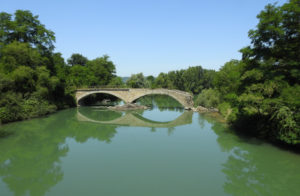
Location: FRB – CESAB, 5 rue de l’École de Médecine, 34000 Montpellier
Contract: Fixed-term contract for 18 months. This is a full-time position.
Closing date: 31st January 2022
Starting date: March 2022
- Supporting climate resilience through equitable ocean conservation – with the FRB-CESAB project BLUE JUSTICE
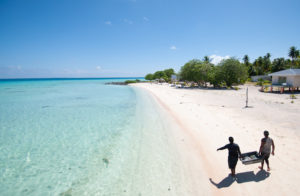
Location: FRB – CESAB, 5 rue de l’École de Médecine, 34000 Montpellier
Contract: Fixed-term contract for 24 months. This is a full-time position.
Closing date: 31st January 2022
Starting date: May 2022

Through its Center for Biodiversity Synthesis and Analysis (CESAB), the French Foundation for Biodiversity Research will open this spring a call for research projects, to fund three innovative projects relating to the synthesis of ideas and concepts and/or the analysis of existing data. The projects should aim to improve scientific knowledge of biodiversity and demonstrate how we can use this knowledge to better protect it. The submitted projects can deal with any topic related to biodiversity, in the fields of natural sciences and/or human and social sciences.
The selected projects will be funded for three years, including: the recruitment of a post-doctoral student for 24 months, the organization of six meetings of the working group at CESAB in Montpellier and the promotion and publication of the results. The CESAB will also provide logistical, technical and administrative support for the project.
Two other targeted calls for projects are under development, there will be more information in the next newsletter: subscribe here!
- Ongoing selection of four synthesis project within the call FRB-MTE-OFB “Impacts on terrestrial biodiversity in the Anthropocene”

These SYNTHESIS 3-years projects will develop syntheses of ideas and/or concepts, analyses of existing data, and will focus on factors affecting the state, evolution and dynamics of biodiversity. The projects are subject to a two-step selection process: five pre-proposals were selected early December to submit a full proposal by January 27, 2022 and the final selection will be announced late March 2022.
Three SYNERGY projects and one SYSTEMATIC MAP project have already been selected within this call.
- Ongoing selection of two synthesis projects within the call SYNERGY FRB-CESAB / SinBiose / FAPESP / CEBA “Biodiversity in the neotropical realm”
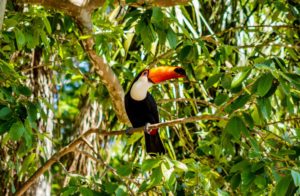
In partnership with SinBiose, FAPESP, and LabEX CEBA, the FRB opened a call in 2021 for research projects through the CESAB, to fund two innovative research projects on biodiversity in the neotropical realm. Four projects are currently being evaluated by the Franco-Brazilian monitoring committee of the call. The results will be announced at the end of March 2022.
The two selected projects will be funded for three years, including: the recruitment of a post-doctoral fellow based in Brazil and working on the project for two years, the organization of four meetings (two in France, at CESAB in Montpellier and two in Brazil in the state of São Paulo) and the promotion and publication of the results. Logistical, technical and administrative for the project support will also be provided.
- Save the date – Conference and training course “From species to functions” on the 16th of June 2022 in Montpellier
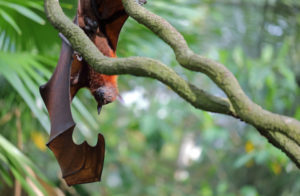
The FRB’s CESAB working groupe FREE invites you to Montpellier for a symposium in English on Thursday, June 16, 2022, entitled “From species to functions: towards a paradigm shift for biodiversity conservation?“
Which species should be protected first? This conference will present a new facet of biological rarity – functional rarity – and will lay the foundations for biodiversity and rarity conservation policies, revisited in the light of functional ecology. The working group FREE has largely contributed to the development of the conceptual basis of functional rarity and has proposed global analyses attempting to identify areas of the globe with a significant proportion of ecologically unique species. During this day, a group of international researchers will discuss the direct and major implications of this research for biodiversity conservation policies. Registration coming soon!
The conference will be held in the afternoon and will be preceded, in the morning, by a training session dedicated to the use of R packages that allows to calculate various functional rarity index and to map them.
Face-to-face meetings resumed in the fall of 2021 in newly expanded premises (more than 300m2): nine groups met between October and December in Montpellier, including two CESABAFTER meetings: complementary meetings during which the AFROBIODRIVERS and RAATD groups were able to extend their research work. Several groups also met remotely. In order to help organize these virtual meetings, the CESAB team has developed a guide to help organize virtual meetings and maintain a scientific dynamic remotely.
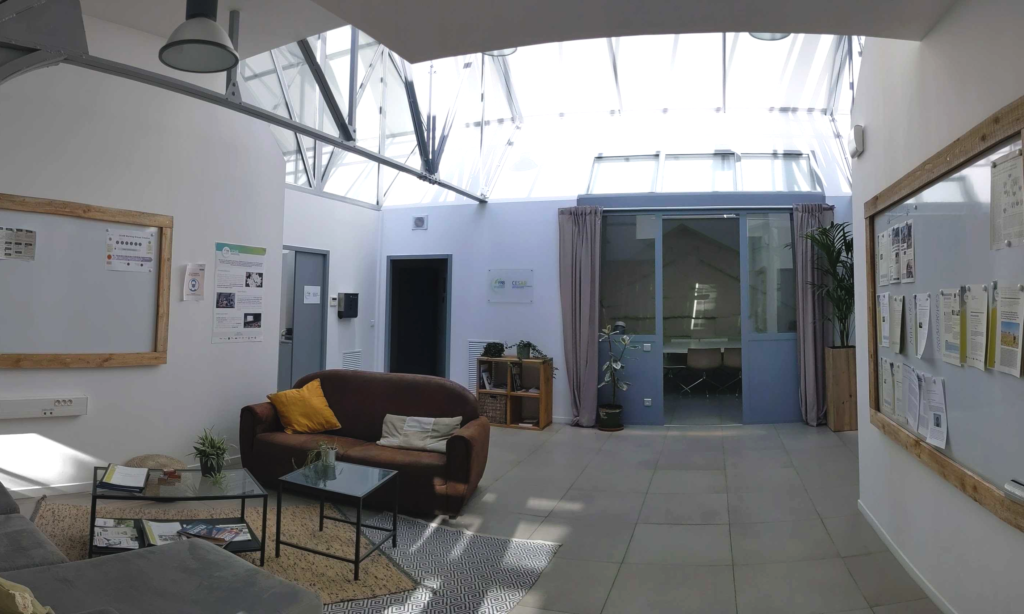
- CESAB welcomes (finally!) researchers on sabbatical

After several postponements due to restrictive sanitary conditions, the CESAB welcomes two researchers on sabbatical in the first semester of 2022: Tom LETESSIER from the Zoological Society of London and Kasey BARTON, from the University of Hawaii (USA). Both researchers are funded through the 2020 call for projects, in partnership with the LabEX Mediterranean Center for Environment and Biodiversity (CeMEB).
- Zoom on the synthesis project FORCIS
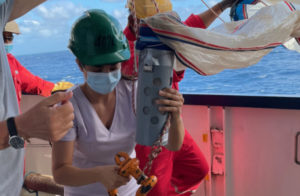
Sonia Chaabane, the post-doctoral fellow within the FORCIS project, went on a mission in July 2021 aboard the French ship Marion Dufresne II to characterize planktonic foraminifera faunas using plankton nets. This work allowed to complete the FORCIS database which includes all existing data of abundance and diversity of living planktonic foraminifera. This will be used to determine the ecological preferences and the response of foraminiferal faunas to recent environmental changes.
You can find some press articles (in French) in Scratch and in Journal de l’Ile de la Réunion.
- Congratulations to CESAB postdocs!

Congratulations to Ryan Reisinger, the post-doctoral fellow within the RAATD project (Retrospective analysis of vertebrates’ tracking data in Antarctica to identify ecologically significant areas) who has just been recruited as a Lecturer in Marine Biology and Ecology at the University of Southampton, UK.
A survey conducted among CESAB project leaders in 2020 had shown that 85% of CESAB post-doctoral fellows are still in academia, and that more than half of them got a permanent position within three years after their postdoc at the FRB.
- Carbon footprint of CESAB meetings
Since its creation, the FRB has encouraged its staff, collaborators and all project stakeholders to favor public transportation and to limit the use of air travel as much as possible to reduce its carbon footprint. At the same time, it is setting up a compensation procedure in cases where air travel is the only feasible means of transport.
As CESAB is particularly concerned, a procedure has been initiated to (1) encourage group participants to travel by train whenever possible in order to reduce the group’s overall carbon footprint, (2) empower groups by dedicating a portion of their budgets to the financial compensation of their emissions, and (3) involve the groups in the allocation of funds.
Although the Covid-19 pandemic has considerably reduced the carbon impact of the groups in 2020 and 2021, the offset approach is well established. Each group funded through CESAB call for proposals is now contributing, via its dedicated budget, to offsetting all or part of its carbon emissions. The first payment will be made at the end of 2022.
- Maintaining momentum for collaborative working groups in a post-pandemic world
Despite the carbon footprint benefits of remote meetings, organized in this COVID context, the directors of several international synthesis centers – including the FRB’s CESAB – warn: “Although these virtual meetings have allowed scientific activity to continue during the pandemic, they cannot replace face-to-face meetings” (Srivastava et al., 2021).
In synthesis centers, typical workgroup dynamics involve productive and varied interactions for twelve hours a day and up to five consecutive days. Virtual sessions are less effective after a few hours as participants tire of staring at a screen. So while virtual meetings can work for short, focused tasks, they are less suited to unstructured, free-flowing discussions – and thus have difficulty creating the social cohesion needed for creative breakthroughs. A hybrid approach that combines the best of virtual and face-to-face could thus eventually evolve into a model that overcomes funding limitations, increases global integration of research while helping to reduce carbon emissions from researcher travel; and does so while maintaining the potential for promoting the collective intelligence that synthesis centers provide.
- New recruits at CESAB

Laura Mannocci is an agricultural engineer specialized in fisheries science and holds a PhD in quantitative marine ecology from the University of La Rochelle (France) in 2013.
Laura joined the FRB in February 2022 as a data scientist and scientific leader of the AI-Biodiv challenge within CESAB. She provides methodological support to the FRB-CESAB working groups with which she collaborates closely. She is also in charge of leading the collaboration between the consortia selected for the AI-Biodiv Challenge on artificial intelligence research in the field of biodiversity.

Aurore Receveur
Aurore Receveur joined the FRB in December 2021 as a post-doctoral fellow and is based at the CESAB in Montpellier. In the framework of the MAESTRO project, she will explore the impact of climate change on the spatial distribution and diversity of demersal fish stocks, especially in the North-East Atlantic and the Mediterranean Sea.
Aurore completed her PhD in New Caledonia (IRD and SPC) where she studied the functioning of the pelagic ecosystem in the southwest Pacific. In particular, she studied the spatiotemporal dynamics of mesopelagic prey, their relationships to the environment and to top predators. She then did a postdoc at the German Fisheries Institute (Thünen Institute; Rostock, Germany), where she studied the effect of environmental changes and anthropogenic pressures on two Baltic Sea fish stocks: herring and cod.
-
- Publications from CESAB working groups
Correa-Carmona Y, Rougerie R, Arnal P, Ballesteros-Mejia L, Beck J, Dolédec S, Ho C, Kitching IJ, Lavelle P, Le Clec’h S, Lopez-Vaamonde C, Martins MB, Murienne J, Oszwald J, Ratnasingham S & Decaëns T (2021) Functional and taxonomic responses of tropical moth communities to deforestation. Insect Conservation and Diversity, accepted. doi: 10.1111/icad.12549.
Decaëns T, Bénéluz F, Ballesteros-Mejia L, Bonilla D & Rougerie R (2021) Description of three new species of Automeris Hübner, 1819 from Colombia and Brazil (Lepidoptera, Saturniidae, Hemileucinae). ZooKeys, 1031, 183–204. doi: 10.3897/zookeys.1031.56035.
Jiménez-Bolívar AC, Prada-Lara L, St Laurent RA & Rougerie R (2021) The Wild Silkmoths (Lepidoptera: Bombycoidea: Saturniidae) of Colombia: a database of occurrence points and taxonomic checklist. Zootaxa, 5081, 151–202. doi: 10.11646/zootaxa.5081.2.1.
Scholte P, Pays O, Adam S, Chardonnet B, Fritz H, Mamang J-B, Prins HHT, Renaud P-C, Tadjo P & Moritz M (2021) Conservation overstretch and long-term decline of wildlife and tourism in the Central African savannas. Conservation Biology, accepted. doi: 10.1111/cobi.13860.
Bennett NJ, Katz L, Yadao-Evans W, Ahmadia GN, Atkinson S, Ban NC, Dawson NM, de Vos A, Fitzpatrick J, Gill D, Imirizaldu M, Lewis N, Mangubhai S, Meth L, Muhl E-K, Obura D, Spalding AK, Villagomez A, Wagner D, White A & Wilhelm A (2021) Advancing social equity in and through marine conservation. Frontiers in Marine Science, 8, 711538. doi: 10.3389/fmars.2021.711538.
Helmstetter AJ, Glemin S, Käfer J, Zenil-Ferguson R, Sauquet H, de Boer H, Dagallier L-PMJ, Mazet N, Reboud EL, Couvreur TLP & Condamine FL (2021) Pulled diversification rates, lineages-through-time plots and modern macroevolutionary modelling. Systematic Biology, accepted. doi: 10.1093/sysbio/syab083.
Magneville C, Loiseau N, Albouy C, Casajus N, Claverie T, Escalas A, Leprieur F, Maire E, Mouillot D & Villéger S (2021) mFD: an R package to compute and illustrate the multiple facets of functional diversity. Ecography, 44, 1–15. doi: 10.1111/ecog.05904.
Bonhomme C, Céréghino R, Carrias J-F, Compin A, Corbara B, Jassey V, Leflaive J, Farjalla VF, Marino NAC, Rota T, Srivastava DS & Leroy C (2021) In situ resistance, not immigration, supports invertebrate community resilience to drought intensification in a neotropical ecosystem. Journal of Animal Ecology, 90, 2015–2026. doi: 10.1111/1365-2656.13392.
Parravicini V, Bender MG, Villéger S, Leprieur F, Pellissier L, Donati FGA, Floeter SR, Rezende EL, Mouillot D & Kulbicki M (2021) Coral reef fishes reveal strong divergence in the prevalence of traits along the global diversity gradient. Proceedings of the Royal Society B: Biological Sciences, 288, 20211712. doi: 10.1098/rspb.2021.1712.
Kakouei K, Kraemer BM, Anneville O, Carvalho L, Feuchtmayr H, Graham JL, Higgins S, Pomati F, Rudstam LG, Stockwell JD, Thackeray SJ, Vanni MJ & Adrian R (2021) Phytoplankton and cyanobacteria abundances in mid‐21st century lakes depend strongly on future land use and climate projections. Global Change Biology, accepted. doi: 10.1111/gcb.15866.
Campagne CS, Langridge J, Claudet J, Mongruel R & Thiébaut E (2021) What evidence exists on how changes in marine ecosystem structure and functioning affect ecosystem services delivery? A systematic map protocol. Environmental Evidence, 10, 36. doi: 10.1186/s13750-021-00251-x.
Bennett NJ, Katz L, Yadao-Evans W, Ahmadia GN, Atkinson S, Ban NC, Dawson NM, de Vos A, Fitzpatrick J, Gill D, Imirizaldu M, Lewis N, Mangubhai S, Meth L, Muhl E-K, Obura D, Spalding AK, Villagomez A, Wagner D, White A & Wilhelm A (2021) Advancing social equity in and through marine conservation. Frontiers in Marine Science, 8, 711538. doi: 10.3389/fmars.2021.711538.
Dawson NM, Coolsaet B, Sterling EJ, Loveridge R, Gross-Camp ND, Wongbusarakum S, Sangha KK, Scherl LM, Phuong Phan H, Zafra-Calvo N, Lavey WG, Byakagaba P, Idrobo CJ, Chenet A, Bennett NJ, Mansourian S & Rosado-May FJ (2021) The role of Indigenous peoples and local communities in effective and equitable conservation. Ecology and Society, 26, 19. doi: 10.5751/ES-12625-260319.
Mannocci L, Villon S, Chaumont M, Guellati N, Mouquet N, Iovan C, Vigliola L & Mouillot D (2021) Leveraging social media and deep learning to detect rare megafauna in video surveys. Conservation Biology, accepted. doi: 10.1111/cobi.13798.
Ghilardi M, Schiettekatte NMD, Casey JM, Brandl SJ, Degregory S, Mercière A, Morat F, Letourneur Y, Bejarano S & Parravicini V (2021) Phylogeny, body morphology, and trophic level shape intestinal traits in coral reef fishes. Ecology and Evolution, 11, 13218–13231. doi: 10.1002/ece3.8045.
Monnier O, Coffre-Vieillard S & Bissery C (2021) Evaluer l’état écologique des récifs coralliens – Réflexions à la croisée des politiques publiques de protection. Office Français de la Biodiversité, Paris, France, 136p. [URL: https://professionnels.ofb.fr/fr/node/1128].
Pozas-Schacre C, Casey JM, Brandl SJ, Kulbicki M, Harmelin-Vivien M, Strona G & Parravicini V (2021) Congruent trophic pathways underpin global coral reef food webs. Proceedings of the National Academy of Sciences of the United States of America, 118, e2100966118. doi: 10.1073/pnas.2100966118.
Strona G, Beck PS, Cabeza M, Fattorini S, Guilhaumon F, Micheli F, Montano S, Ovaskainen O, Planes S, Veech JA & Parravicini V (2021) Ecological dependencies make remote reef fish communities most vulnerable to coral loss. Nature Communications, 12, 7282. doi: 10.1038/s41467-021-27440-z.
Strona G, Lafferty KD, Fattorini S, Beck PS, Guilhaumon F, Arrigoni R, Montano S, Seveso D, Galli P, Planes S & Parravicini V (2021) Global tropical reef fish richness could decline by around half if corals are lost. Proceedings of the Royal Society B: Biological Sciences, 288, 20210274. doi: 10.1098/rspb.2021.0274.
-
- Publications from the FRB-CESAB team
Danner M-C, Azams SO, Robertson A, Perkins D, Behrends V & Reiss J (2021) It more than adds up: interaction of antibiotic mixing and temperature. Life, 11, 1435. doi: 10.3390/life11121435.
Srivastava DS, Winter M, Gross LJ, Metzger JP, Baron JS, Mouquet N, Meagher TR, Halpern BS & Pillar VD (2021) Maintaining momentum for collaborative working groups in a post-pandemic world. Nature Ecology & Evolution. doi: 10.1038/s41559-021-01521-0.
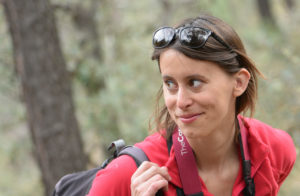
Anne-Christine Monnet, Postdoc within the FRB-CESAB project WOODIV, funded from 2016 to 2019
I am currently a postdoctoral researcher working at the CESCO lab in Paris, at the French Natural History Museum. My research in biogeography aims to better understand the mechanisms behind the spatial distribution of species or species assemblages. In this objective, I got used to conducting modelling and spatial analysis of large data sets. Also naturalist, I am particularly involved in strengthening the links between the collection and use of naturalist data and their analysis and use in modelling. I am currently working on the impact of pesticides on French bird populations. Even if the interest of such a project for society is obvious, I wonder more and more about the link between our research and society. To discuss this topic, I organized a thematic day with the French Society of Ecology and Evolution (SFE2) on the role of ecologists in the face of the ecological crisis.
I am currently completing a literature review of scientific papers that have considered the taxonomic, functional, and phylogenetic facets of diversity to question their contributions to conservation over the last decade. I started this project when I was working at the CESAB. I was postdoc coordinator of the WOODIV project in 2017, for more than a year, under the supervision of Agathe Leriche (IMBE) on the multifaceted diversity of Mediterranean trees. The spatial distribution of endemic, emblematic Mediterranean tree species or timber species is well known. Still, knowledge was lacking on most of the Mediterranean species, with significant disparities between countries. Despite being the largest representative of the Mediterranean climate in the world, the Mediterranean basin did not have a complete phylogeny for tree species. However, this knowledge is critical for conducting reliable biogeographic studies in Europe, where the Mediterranean basin has played a crucial role as a refuge in the past. The WOODIV project has built a database for all European Mediterranean trees, including their functional traits, phylogeny, and spatial occurrences, highlighting the unsuspectedly high richness of Mediterranean trees (Monnet et al., 2021). This work has been possible thanks to a close collaboration between ecologists, botanists, and modellers from six countries. Thanks to their field knowledge, botanists have identified 44 cryptic tree species that rarely display as actual trees.
This step of data collection can be tedious. However, it is what makes the WOODIV database so rich today. This project was my first work in a large consortium with different disciplines and cultures. While the benefits of synthesis projects are evident in providing new answers to questions that cross disciplines and national boundaries, collaborative work also brings its own challenges. We could discuss this issue among postdocs at a meeting organized by the CESAB. So I learned a lot about co-construction of a project during the CESAB project, which will be an added value for the rest of my career.
- WOODIV is still active: four publications were published after the project was finished and one got an award for the best scientific publication in 2020 from the French Botanical Society.
- You can also learn more on the process behind the publication “WOODIV, a database of occurrences, functional traits, and phylogenetic data for all Euro-Mediterranean trees” in this article, written by Anne-Christine Monnet.
